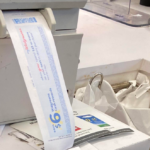
Which is worse – counterfeiting more than a million dollars worth of coupons, or the fact that a lot of people think that barely counts as a crime?
“A criminal scamming criminals,” reads one of many online comments, reacting to last week’s news that a Louisiana man had been charged with creating and selling fake printable coupons over the internet.
30-year-old Beau Wattigney of New Orleans faces a maximum penalty of decades behind bars, and at least a million dollars in fines and restitution, if convicted. Using the screen name PurpleLotus, he’s accused of selling at least 2,000 fake coupons online, with a face value of more than a million dollars, victimizing dozens of companies including major manufacturers like Kraft and Procter & Gamble.
And in the world of counterfeit coupons, that’s only the tip of the iceberg.
The Coupon Information Corporation estimates that coupon fraud costs companies hundreds of millions of dollars every year. And “there’s been an increase in counterfeit coupons over the past few years,” CIC Executive Director Bud Miller told Coupons in the News.
But some seem to have more sympathy for the alleged perpetrators, than the victims – as evidenced by a number of online comments in recent days, reacting to the charges against Wattigney:
- “Yeah, let’s lock up the little guy. One million dollars in damages? Geez – for some of these companies that’s a day’s worth of revenue.”
- “Why can’t the feds enforce the no-call list for telemarketers instead of saving Procter & Gamble from losing 30 cents on a roll of toilet paper?”
- “Most of these processed ‘food’ manufacturers are making money hand-over-fist destroying peoples’ health… So philosophically it’s sort of like stealing from crooks.”
Even the PurpleLotus himself appears to be somewhat incredulous about the whole thing. While it’s not possible to verify the authenticity of the postings, a reddit user with the handle TheRealPurpleLotus identified himself as Beau Wattigney, and made several comments on the message board over the weekend. “Yes, I’m going to prison over coupons,” he wrote.
People don’t print fake dollar bills and act surprised that it’s illegal. And they don’t take things from stores without paying, and wonder why anyone would care.
But somehow, counterfeit coupons are widely perceived in many circles as not such a big deal. Many experienced counterfeit coupon users simply advise budding scammers to play dumb if they’re caught using a bogus coupon, and to say they got it online and had no idea it was fake.
But the consequences of getting caught can be far more serious. “Presenting a known counterfeit coupon at a retail establishment, and having a monetary deduction taken off the price of one’s purchase, is a crime,” Jane Beauchamp, the president of fraud investigation company Brand Technologies, told Coupons in the News. “Such activity can open up the fraudster to numerous criminal charges.”
And it can cost their victims millions. Sure, a big corporation isn’t going to go under, losing a dollar here and a dollar there. But the sheer number of known counterfeits out there (more than 8,000, by the CIC’s latest count) is costing companies more than just a few dollars.
Even when the counterfeiters are caught, the companies are unlikely to recover much. In 2013, convicted counterfeiter Lucas Henderson was ordered to pay his victims $900,000. That money is being garnished from his wages – a process that will likely take decades, assuming he’s even able to get a well-paying job as a convicted felon. And in 2014, three Phoenix women convicted of selling counterfeit coupons were ordered to pay $1.3 million to Procter & Gamble – an amount the company may never ultimately see.
So how do these companies make up for their losses? “This type of activity ultimately harms consumers,” Miller said. The more money that companies lose to fraud, the less likely they are to offer significant savings for the rest of us.
And then only the counterfeiters will be saving serious money. At least until they’re caught, that is, and then – yes – sent to prison over coupons. And while they do the time, the rest of us may well be stuck paying the price.











Pingback: Consumers Warned Against Counterfeit Coupons, ConsequencesLiving Rich With Coupons®
I am naive I guess, but how did he make counterfeit coupons? Did he photocopy the printables?
There are more details in the story below, but in a nutshell, he’s accused of using software to make authentic-looking printable coupons from scratch on a home computer:
https://couponsinthenews.com/2015/05/28/man-charged-with-creating-selling-more-than-1-million-in-counterfeit-coupons/
This causes coupons to be lower in value because the company takes a financial hit. There is an impact on the honest consumer. It’s the whole “it’s just a drop in the ocean” mentatility.
Fraud is fraud, and it comes back to all of us. How about getting the people that are selling the coupon inserts also. Where are they getting these? Stealing? Then making money? That’s why you can never get anything that’s on sale and you have the coupon from Sundays paper. You got people buying 20 inserts and clearing out shelves.
Agreed!!! And those “coupon fairies” as they are called in the coupon world charge insane prices for them and try and put it off as “the insert is free, you are paying for my time…gas…shipping…and wear and tear on my vechicle” REALLY??? So ridiculous!!!! …or those that steal an entire pad of coupons off a store display then turn around and sell them for $2 for 10 or whatever…or the ones that steal all the coupons that are taped to each product and selling them. It’s a HUGE business for some people. So sad…
I started taking coupons (that I’ll use on a different shopping trip) off the packages because ALOT of stores advertise the sale price and include the attached coupon…For example, Arm & Hammer laundry detergent: regular price $8.98, on sale for $2.99 with coupon on package.” Then you get there, there are none with the coupons. I’ve argued that they’ve advertised it for that price, but there are no coupons so how can people buy it for that? They don’t care.
Of course, I don’t sell my coupons.
If you read the rest of this story…. the guy that created Silk Road is going to prison for life for creating his “dark market” website.
My opinion a scam is a scam, and Beau is no different than Bernie Madoff, in my opinion. Both sold something that was fraudulent and didn’t exist.